高级英语精品课程立项申请书
【2018最新】大学英语,精品课程,申报材料-范文模板 (6页)
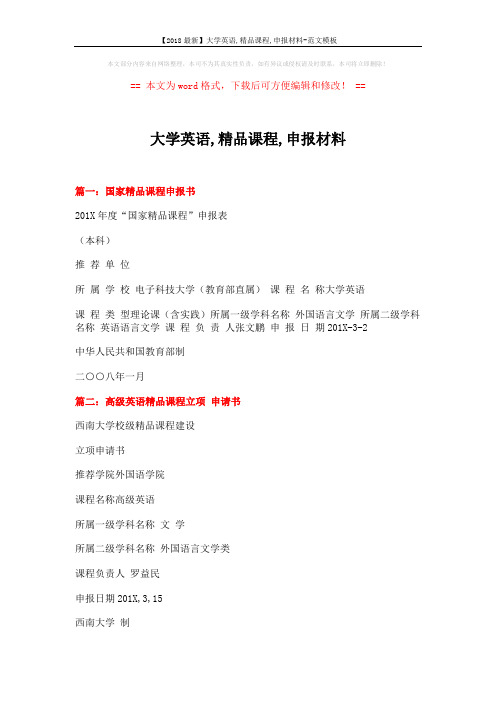
教学录像
3.师资队伍:
课程负责人
基本信息 教学情况
教学情况学术研究 学术研究 学生评价 骨干教师 基本信息
教学团队 申报书P20-23(上)
教学改革
项目著作论文
教师获奖整理中
师资培训
4.课程描述
课程发展历史
教学大纲
教学日历
课程 教案
知识模块
资源分类
视频材料(按教材课文分)
音频材料
PPT
本文部分内容来自网络整理,本司不为其真实性负责,如有异议或侵权请及时联系,本司将立即删除!
== 本文为word格式,下载后可方便编辑和修改! ==
大学英语,精品课程,申报材料
篇一:国家精品课程申报书
201X年度“国家精品课程”申报表
(本科)
推 荐 单 位
所 属 学 校 电子科技大学(教育部直属) 课 程 名 称大学英语
所属二级学科名称 外国语言文学类
课程负责人 罗益民
申报日期201X,3,15
西南大学 制
年 月 日
填 写 要 求
一、请严格按表中要求如实填写各项。
二、申报表文本中外文名词第一次出现时,要写清全称和缩写,再次出现同一词
时可以使用缩写。
三、请以word文档格式填写表中各栏目。
四、凡涉密内容不得填写,需要说明的,请在本表说明栏中注明。凡有可能涉密
8.学习平台
自建学习平台
大学 英语 课程库
大学 英语 提高层次课程库
体验英语网络学习系统
新理念大学英语网络学习系统
9.教学录像链接到教学理念的教学录像
10.政策措施
课 程 类 型理论课(含实践)所属一级学科名称 外国语言文学 所属二级学科名称 英语语言文学 课 程 负 责 人张文鹏 申 报 日 期201X-3-2
精品课建设立项申请书模板
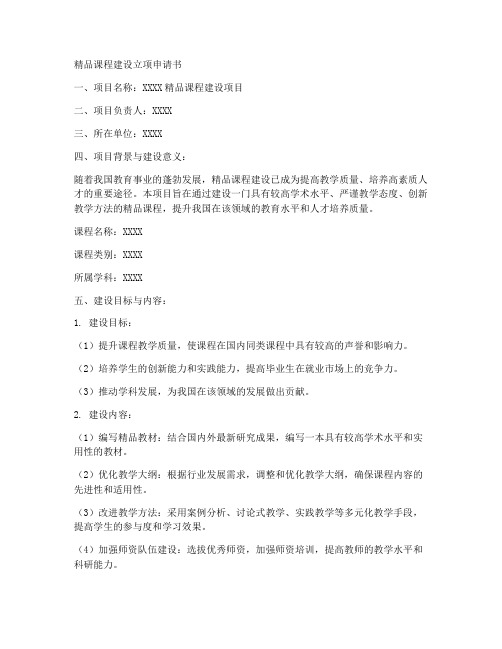
精品课程建设立项申请书一、项目名称:XXXX精品课程建设项目二、项目负责人:XXXX三、所在单位:XXXX四、项目背景与建设意义:随着我国教育事业的蓬勃发展,精品课程建设已成为提高教学质量、培养高素质人才的重要途径。
本项目旨在通过建设一门具有较高学术水平、严谨教学态度、创新教学方法的精品课程,提升我国在该领域的教育水平和人才培养质量。
课程名称:XXXX课程类别:XXXX所属学科:XXXX五、建设目标与内容:1. 建设目标:(1)提升课程教学质量,使课程在国内同类课程中具有较高的声誉和影响力。
(2)培养学生的创新能力和实践能力,提高毕业生在就业市场上的竞争力。
(3)推动学科发展,为我国在该领域的发展做出贡献。
2. 建设内容:(1)编写精品教材:结合国内外最新研究成果,编写一本具有较高学术水平和实用性的教材。
(2)优化教学大纲:根据行业发展需求,调整和优化教学大纲,确保课程内容的先进性和适用性。
(3)改进教学方法:采用案例分析、讨论式教学、实践教学等多元化教学手段,提高学生的参与度和学习效果。
(4)加强师资队伍建设:选拔优秀师资,加强师资培训,提高教师的教学水平和科研能力。
(5)完善教学设施:配置先进的教学设备和资源,为课程建设提供有力支持。
六、项目实施方案:1. 项目负责人负责整体项目的组织和管理,确保项目按计划推进。
2. 组织教师参加相关培训,提高教学水平和科研能力。
3. 开展教学改革和研究,不断优化教学内容和方法。
4. 定期组织教学质量评估,确保教学质量持续提升。
5. 加强与企业、科研机构的合作,推动产学研一体化发展。
七、项目预算与资金需求:1. 教材编写与印刷费用:XXX元2. 师资培训费用:XXX元3. 教学设备购置费用:XXX元4. 教学改革与研究费用:XXX元总计:XXX元八、项目预期成果:1. 形成一套具有较高学术水平和实用性的教材。
2. 提高课程教学质量,获得国内同行的认可和好评。
高级英语精品课程立项申请书
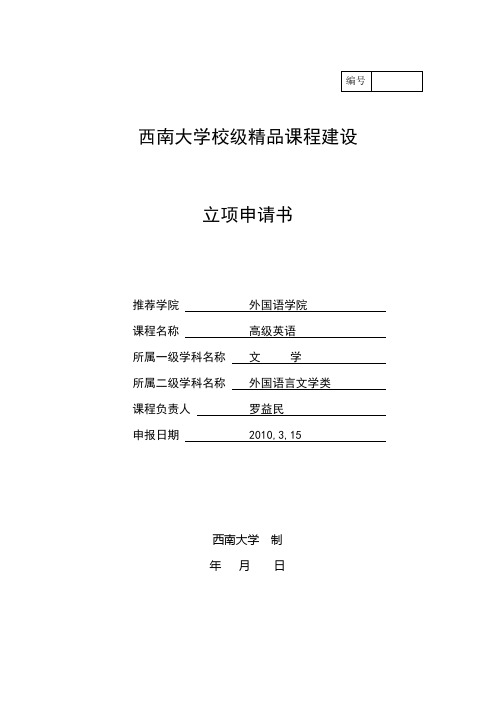
西南大学校级精品课程建设
立项申请书
推荐学院外国语学院
课程名称高级英语
所属一级学科名称文学
所属二级学科名称外国语言文学类
课程负责人罗益民
申报日期 2010,3,15
西南大学制
年月日
填写要求
一、请严格按表中要求如实填写各项。
二、申报表文本中外文名词第一次出现时,要写清全称和缩写,再次
出现同一词时可以使用缩写。
三、请以word文档格式填写表中各栏目。
四、凡涉密内容不得填写,需要说明的,请在本表说明栏中注明。
凡
有可能涉密和不宜大范围公开的内容,请在说明栏中注明。
[1]
[1]课程负责人指主持本门课程建设的主讲教师。
2.教学队伍情况
3.课程描述。
英语课题立项申请书怎么写范文

英语课题立项申请书怎么写范文您好,以下是一份关于英语课题立项申请书的范文:[您的姓名][您的职称/职位][所在学校/机构名称][所在城市/地区名称][联系电话][电子邮件地址][日期][项目审批部门名称][所在学校/机构名称][所在城市/地区名称]主题:英语课题立项申请书尊敬的[项目审批部门名称]:我谨以此函向贵部门提交一份英语课题立项申请,希望得到您的审批和支持。
一、项目背景与目标随着全球化和信息化的快速发展,英语已经成为一门备受重视的国际通用语言。
然而,在我国目前的英语教育中,存在着一系列问题,如学生的口语表达能力不足、学生对英语学习的兴趣不高等。
因此,本课题旨在探索一种有效的英语教学方法,提升学生的口语表达能力和学习兴趣。
具体目标如下:1. 通过创新的教学模式和活动设计,提高学生的口语交流能力;2. 激发学生学习英语的兴趣,培养他们的自主学习能力;3. 促进学生跨文化交流能力和跨学科学习能力的提升。
二、项目内容与方法本课题计划开展以下几项内容和方法:1. 设计并实施一系列针对口语表达的英语教学活动,如角色扮演、小组讨论等;2. 引入新颖的教学工具和技术,如在线学习平台、智能语音识别等;3. 结合文化和跨学科元素,设计有趣、实用的课程内容;4. 进行实地调研和访谈,了解学生对英语学习的需求和困难,以便根据实际情况进行调整和优化。
三、预期成果与效益通过本课题的开展,预期将取得以下成果和效益:1. 学生的口语表达能力将得到有效提升,取得更好的英语学习成绩;2. 学生对英语学习的兴趣将大幅提高,增强其自主学习动力;3. 学生的跨文化交流能力和跨学科学习能力得到锻炼和提升;4. 推广应用本课题成果,进一步推进英语教育改革与创新;5. 促进学校/机构的教育教学水平的提高,提升学校/机构的影响力和竞争力。
四、项目计划与预算本项目计划从[开始日期]开始,历时[预计时长],经费预算总计[预算金额]。
具体项目计划和预算细节,将在得到您的批准后进行详细编制和提交。
课题立项申请书英语教学

课题立项申请书英语教学Research Proposal on English Language Teaching.Abstract:The purpose of this research proposal is to investigate the effectiveness of learner-centered approaches in improving English language proficiency among secondary school students. The proposal outlines the research design, methodology, data collection, and analysis methods to be employed in the study.Background:English language teaching has been a fundamental aspect of education globally, with various methodologies emerging to meet the diverse needs of learners. Traditional teacher-centered approaches have long been prevalent in second language instruction, prioritizing content delivery and teacher authority. However, recent research advocates forlearner-centered approaches that empower students and promote active engagement in the learning process.Research Questions:1. To what extent do learner-centered approaches enhance English language proficiency in terms of speaking, listening, reading, and writing?2. What are the specific aspects of learner-centered approaches that contribute to improved language proficiency?Methodology:The study will adopt a quantitative research design using a quasi-experimental method. Participants will be randomly assigned to two groups: an experimental group implementing learner-centered approaches and a controlgroup following a traditional teacher-centered approach.Data collection will involve:1. Preand post-tests to measure changes in English language proficiency using standardized language assessments.2. Classroom observations to document the implementation of learner-centered approaches and student engagement.3. Student surveys to gather feedback and insights into their experiences with the different methodologies.Data Analysis:1. Statistical analysis to compare the language proficiency scores between the experimental and control groups.2. Qualitative analysis of classroom observation data and student surveys to identify the specific aspects of learner-centered approaches that contribute to enhanced language proficiency.Significance:This research will provide valuable insights into the effectiveness of learner-centered approaches in improving English language proficiency among secondary school students. The findings will help educators refine their pedagogical practices, fostering a more learner-centric educational environment that empowers students to actively engage in their language learning journey.中文回答:课题立项申请书,英语教学。
课题立项申请书英语教学
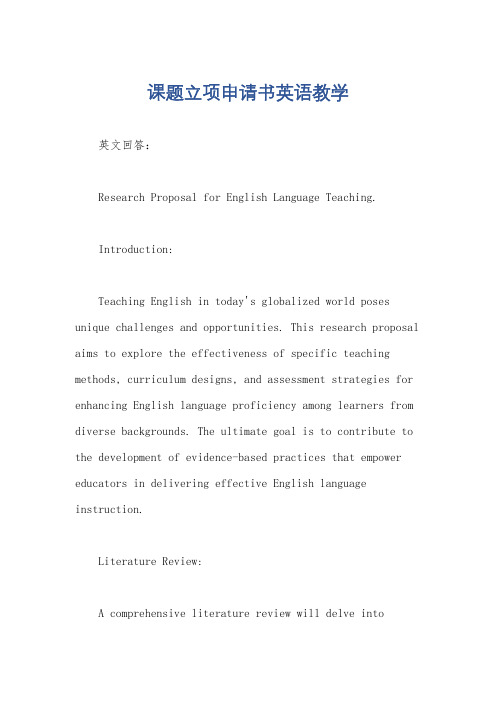
课题立项申请书英语教学英文回答:Research Proposal for English Language Teaching.Introduction:Teaching English in today's globalized world poses unique challenges and opportunities. This research proposal aims to explore the effectiveness of specific teaching methods, curriculum designs, and assessment strategies for enhancing English language proficiency among learners from diverse backgrounds. The ultimate goal is to contribute to the development of evidence-based practices that empower educators in delivering effective English language instruction.Literature Review:A comprehensive literature review will delve intoexisting research on the most effective approaches to English language teaching. This will include an examination of the cognitive, linguistic, and sociocultural factorsthat influence language acquisition. The review will also highlight the strengths and limitations of different teaching methods, from traditional grammar-translation to more interactive and communicative approaches.Research Questions:This research will investigate the following key questions:1. What teaching methods are most effective for developing learners' English language skills (reading, writing, speaking, and listening)?2. How can curriculum design be optimized to cater to the unique needs of learners from diverse linguistic and cultural backgrounds?3. What assessment strategies can accurately measurelearners' English language proficiency and provide meaningful feedback?Methodology:To answer these research questions, the study will employ a mixed-methods approach, combining bothquantitative and qualitative data collection techniques. This will include:1. Quantitative data collection: A quasi-experimental design will be used to compare the effectiveness of different teaching methods and curriculum designs. Learners will be randomly assigned to different treatment groups and their performance will be assessed using standardized language proficiency tests.2. Qualitative data collection: Observations, interviews, and focus groups will be conducted to gain insights into the experiences and perspectives of learners and teachers. This data will provide a deeper understanding of the processes involved in language acquisition and thefactors that influence learning outcomes.Expected Outcomes:This research aims to generate practical recommendations for English language teaching professionals. The expected outcomes include:1. Empirical evidence on the effectiveness of different teaching methods and curriculum designs.2. Insights into the best practices for catering to learners from diverse backgrounds.3. The development of assessment strategies that are valid, reliable, and provide actionable feedback.Significance:This research has significant implications for thefield of English language teaching. The findings will contribute to the advancement of knowledge about howlearners acquire English as a second or foreign language. By providing evidence-based recommendations, this research will empower educators to make informed decisions about their teaching practices, leading to improved learning outcomes for English language learners worldwide.中文回答:英语教学课题立项申请书。
【最新】大学英语,精品课程,申报材料-优秀word范文 (6页)

[1]
篇三:大学英语网络教育精品课程
大学英语网络教育精品课程
1.申报书
2.教学理念:
教学指导思想
课程总体设计
课程目标
资源建设
学习活动设计
学习评价方式
机考方式 申报书P7 无纸化计算机考试模式+视频
照片
网络方式 申报书P7 A点+照片
口语方式 暂无
教学环境场地
本文部分内容来自网络整理,本司不为其真实性负责,如有异议或侵权请及时联系,本司将立即删除!
== 本文为word格式,下载后可方便编辑和修改! ==
大学英语,精品课程,申报材料
篇一:国家精品课程申报书
201X年度“国家精品课程”申报表
(本科)
推 荐 单 位
所 属 学 校 电子科技大学(教育部直属) 课 程 名 称大学英语
8.学习平台
自建学习平台
大学 英语 课程库
大学 英语 提高层次课程库
体验英语网络学习系统
新理念大学英语网络学习系统
9.教学录像链接到教学理念的教学录像
10.政策措施
课 程 类 型理论课(含实践)所属一级学科名称 外国语言文学 所属二级学科名称 英语语言文学 课 程 负 责 人张文鹏 申 报 日 期201X-3-2
中华人民共和国教育部制
二○○八年一月
篇二:高级英语精品课程立项 申请书
西南大学校级精品课程建设
立项申请书
推荐学院外国语学院
课程名称高级英语
所属一级学科名称 文 学
课程技术特征
5.学习管理
学习过程管理
手段措施
学习评价
测试试卷
测试成绩
大学英语立项申请书模板
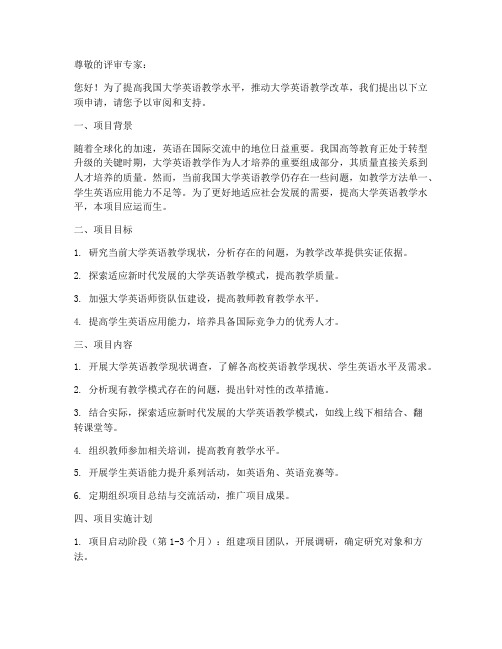
尊敬的评审专家:您好!为了提高我国大学英语教学水平,推动大学英语教学改革,我们提出以下立项申请,请您予以审阅和支持。
一、项目背景随着全球化的加速,英语在国际交流中的地位日益重要。
我国高等教育正处于转型升级的关键时期,大学英语教学作为人才培养的重要组成部分,其质量直接关系到人才培养的质量。
然而,当前我国大学英语教学仍存在一些问题,如教学方法单一、学生英语应用能力不足等。
为了更好地适应社会发展的需要,提高大学英语教学水平,本项目应运而生。
二、项目目标1. 研究当前大学英语教学现状,分析存在的问题,为教学改革提供实证依据。
2. 探索适应新时代发展的大学英语教学模式,提高教学质量。
3. 加强大学英语师资队伍建设,提高教师教育教学水平。
4. 提高学生英语应用能力,培养具备国际竞争力的优秀人才。
三、项目内容1. 开展大学英语教学现状调查,了解各高校英语教学现状、学生英语水平及需求。
2. 分析现有教学模式存在的问题,提出针对性的改革措施。
3. 结合实际,探索适应新时代发展的大学英语教学模式,如线上线下相结合、翻转课堂等。
4. 组织教师参加相关培训,提高教育教学水平。
5. 开展学生英语能力提升系列活动,如英语角、英语竞赛等。
6. 定期组织项目总结与交流活动,推广项目成果。
四、项目实施计划1. 项目启动阶段(第1-3个月):组建项目团队,开展调研,确定研究对象和方法。
2. 项目实施阶段(第4-8个月):开展教学现状调查,分析问题,探索教学模式,组织教师培训。
3. 项目推进阶段(第9-12个月):推广项目成果,开展学生英语能力提升活动,总结项目经验。
4. 项目总结阶段(第13-15个月):撰写项目总结报告,提交成果,进行项目评估。
五、项目预期成果1. 形成一套科学的大学英语教学现状分析报告。
2. 提出一套适应新时代发展的大学英语教学模式。
3. 提高一批大学英语教师的教育教学水平。
4. 提升学生的英语应用能力,培养更多具备国际竞争力的优秀人才。
高中英语课题立项申请书
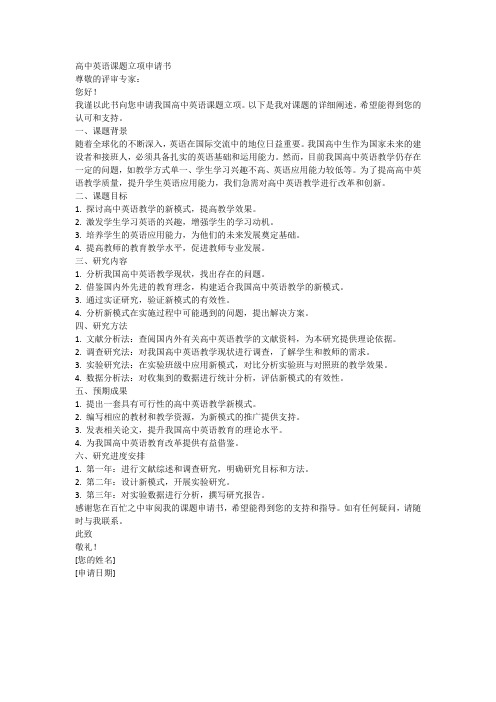
高中英语课题立项申请书尊敬的评审专家:您好!我谨以此书向您申请我国高中英语课题立项。
以下是我对课题的详细阐述,希望能得到您的认可和支持。
一、课题背景随着全球化的不断深入,英语在国际交流中的地位日益重要。
我国高中生作为国家未来的建设者和接班人,必须具备扎实的英语基础和运用能力。
然而,目前我国高中英语教学仍存在一定的问题,如教学方式单一、学生学习兴趣不高、英语应用能力较低等。
为了提高高中英语教学质量,提升学生英语应用能力,我们急需对高中英语教学进行改革和创新。
二、课题目标1. 探讨高中英语教学的新模式,提高教学效果。
2. 激发学生学习英语的兴趣,增强学生的学习动机。
3. 培养学生的英语应用能力,为他们的未来发展奠定基础。
4. 提高教师的教育教学水平,促进教师专业发展。
三、研究内容1. 分析我国高中英语教学现状,找出存在的问题。
2. 借鉴国内外先进的教育理念,构建适合我国高中英语教学的新模式。
3. 通过实证研究,验证新模式的有效性。
4. 分析新模式在实施过程中可能遇到的问题,提出解决方案。
四、研究方法1. 文献分析法:查阅国内外有关高中英语教学的文献资料,为本研究提供理论依据。
2. 调查研究法:对我国高中英语教学现状进行调查,了解学生和教师的需求。
3. 实验研究法:在实验班级中应用新模式,对比分析实验班与对照班的教学效果。
4. 数据分析法:对收集到的数据进行统计分析,评估新模式的有效性。
五、预期成果1. 提出一套具有可行性的高中英语教学新模式。
2. 编写相应的教材和教学资源,为新模式的推广提供支持。
3. 发表相关论文,提升我国高中英语教育的理论水平。
4. 为我国高中英语教育改革提供有益借鉴。
六、研究进度安排1. 第一年:进行文献综述和调查研究,明确研究目标和方法。
2. 第二年:设计新模式,开展实验研究。
3. 第三年:对实验数据进行分析,撰写研究报告。
感谢您在百忙之中审阅我的课题申请书,希望能得到您的支持和指导。
英语课题立项申请书范文
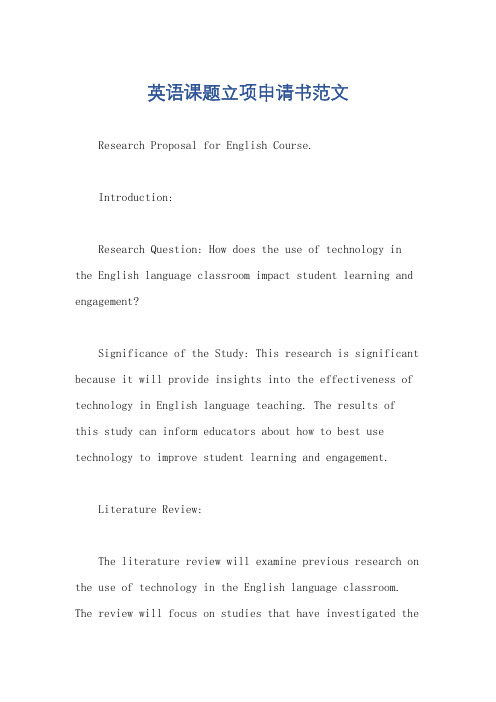
英语课题立项申请书范文Research Proposal for English Course.Introduction:Research Question: How does the use of technology in the English language classroom impact student learning and engagement?Significance of the Study: This research is significant because it will provide insights into the effectiveness of technology in English language teaching. The results ofthis study can inform educators about how to best use technology to improve student learning and engagement.Literature Review:The literature review will examine previous research on the use of technology in the English language classroom. The review will focus on studies that have investigated theimpact of technology on student learning, engagement, and motivation.Methodology:The research will use a mixed-methods approach. Quantitative data will be collected through surveys and questionnaires. Qualitative data will be collected through interviews and observations.Data Analysis:The quantitative data will be analyzed usingstatistical software. The qualitative data will be analyzed using thematic analysis.Expected Outcomes:The expected outcomes of this research are:1. A better understanding of the impact of technology on student learning and engagement in the English languageclassroom.2. Recommendations for how to best use technology inthe English language classroom.Timeline:The research will be conducted over a period of one year. The research will be completed by the end of May 2024.Budget:The budget for this research is $5,000. The budget will be used to cover the costs of data collection, data analysis, and dissemination of results.References:[1] Egbert, J., & Petrie, H. (2013). Technology in the language classroom: A literature review. Language Teaching Research, 17(2), 193-215.[2] Warschauer, M., & Matuchniak, T. (2010). New technologies and second language learning. Annual Review of Applied Linguistics, 30, 24-45.中文回答:研究课题申请书。
英语课题立项申请书范文

英语课题立项申请书范文Proposal for English Curriculum Development Project.1. Project Overview.Project Title: Enhancing English Language Skills Through Immersive Learning Experiences.Project Duration: One academic year (two semesters)。
Target Group: Secondary school students aged 13-16。
Project Aims:1. To improve students' English language proficiency through practical and immersive learning experiences.2. To enhance students' cultural understanding and intercultural communication skills.3. To foster a positive attitude towards language learning and global engagement.2. Project Background.In today's interconnected world, proficiency in English has become a crucial skill for personal and professional success. However, traditional teaching methods often fail to engage students, resulting in a disconnect between learning and real-world applications. This project aims to bridge this gap by incorporating immersive learning experiences into the English curriculum.3. Project Objectives.To design and implement an immersive learning program that integrates English language learning with real-world contexts.To create a curriculum that encourages active participation and collaboration among students.To evaluate the effectiveness of the program through regular assessments and feedback mechanisms.4. Methodology.Curriculum Design:+ Incorporate themes such as global issues, cross-cultural communication, and technology into lesson plans.+ Develop interactive activities and role-plays to simulate real-world scenarios.+ Utilize multimedia resources and technology tools to enhance learning.Immersive Learning Experiences:+ Arrange visits to local businesses and organizations to provide practical language use opportunities.+ Collaborate with other schools or educational institutions to create an international student exchange program.+ Encourage participation in language-related competitions and workshops.Assessment and Feedback:+ Regularly assess students' progress through written assignments, oral presentations, and group projects.+ Collect feedback from students, teachers, and parents to improve the program.5. Expected Outcomes.Significant improvement in students' English proficiency levels.Enhanced cultural awareness and intercultural communication skills.Increased motivation and engagement in language learning.Development of a positive attitude towards global engagement and cross-cultural understanding.6. Resources Required.Funding for program implementation and materials.Access to local businesses and organizations for immersion experiences.Technology tools and multimedia resources for enhanced learning.Collaboration with other schools or educational institutions for exchange programs.7. Implementation Plan.Phase 1 (Month 1-2): Curriculum design and planning.Phase 2 (Month 3-6): Implementation of the immersive learning program.Phase 3 (Month 7-8): Mid-term assessment and feedback collection.Phase 4 (Month 9-12): Continuation of the program with adjustments based on feedback.Phase 5 (End of Year): Final assessment and evaluation of the program's effectiveness.8. Conclusion.By implementing this English curriculum development project, we aim to transform traditional language learning into an engaging and meaningful experience for students. Through immersive learning opportunities, students will not only improve their English proficiency but also gain valuable cross-cultural insights and global perspectives.We believe that this approach will foster a generation of young learners who are not only proficient in English but also passionate about global engagement and cultural exchange.。
英语课题立项申请书模板
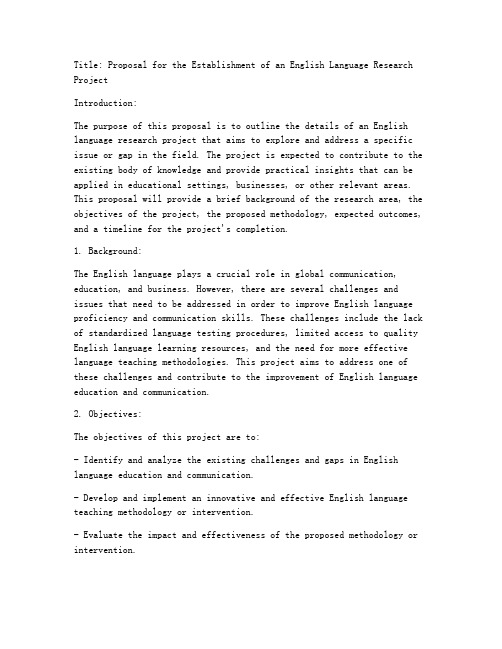
Title: Proposal for the Establishment of an English Language Research ProjectIntroduction:The purpose of this proposal is to outline the details of an English language research project that aims to explore and address a specific issue or gap in the field. The project is expected to contribute to the existing body of knowledge and provide practical insights that can be applied in educational settings, businesses, or other relevant areas. This proposal will provide a brief background of the research area, the objectives of the project, the proposed methodology, expected outcomes, and a timeline for the project's completion.1. Background:The English language plays a crucial role in global communication, education, and business. However, there are several challenges and issues that need to be addressed in order to improve English language proficiency and communication skills. These challenges include the lack of standardized language testing procedures, limited access to quality English language learning resources, and the need for more effective language teaching methodologies. This project aims to address one of these challenges and contribute to the improvement of English language education and communication.2. Objectives:The objectives of this project are to:- Identify and analyze the existing challenges and gaps in English language education and communication.- Develop and implement an innovative and effective English language teaching methodology or intervention.- Evaluate the impact and effectiveness of the proposed methodology or intervention.- Disseminate the findings of the project to relevant stakeholders and contribute to the existing body of knowledge.3. Proposed Methodology:The proposed methodology for this project will involve several steps, including:- Conducting a thorough literature review to identify the existing challenges and gaps in English language education and communication.- Developing and implementing an innovative and effective English language teaching methodology or intervention, based on the findings of the literature review.- Conducting empirical research to evaluate the impact and effectiveness of the proposed methodology or intervention.- Analyzing and interpreting the data collected during the research phase.- Disseminating the findings of the project through research papers, presentations, or other relevant means.4. Expected Outcomes:The expected outcomes of this project include:- A comprehensive understanding of the existing challenges and gaps in English language education and communication.- The development and implementation of an innovative and effective English language teaching methodology or intervention.- Empirical evidence on the impact and effectiveness of the proposed methodology or intervention.- A contribution to the existing body of knowledge in the field of English language education and communication.- Enhanced English language proficiency and communication skills among the target population.5. Timeline:The proposed timeline for the completion of this project is as follows:- Month 1-3: Conducting a thorough literature review and identifying the existing challenges and gaps in English language education and communication.- Month 4-6: Developing and implementing an innovative and effective English language teaching methodology or intervention.- Month 7-9: Conducting empirical research to evaluate the impact and effectiveness of the proposed methodology or intervention.- Month 10-12: Analyzing and interpreting the data collected during the research phase, and preparing research papers or presentations for dissemination.Conclusion:In conclusion, this project aims to contribute to the improvement of English language education and communication by addressing a specific challenge or gap in the field. The proposed methodology and timelinewill ensure the effective implementation and evaluation of the project, leading to meaningful outcomes that can be disseminated to relevant stakeholders. The successful completion of this project will provide valuable insights and practical solutions that can be applied in educational settings, businesses, or other relevant areas.。
英语教育立项申请书模板
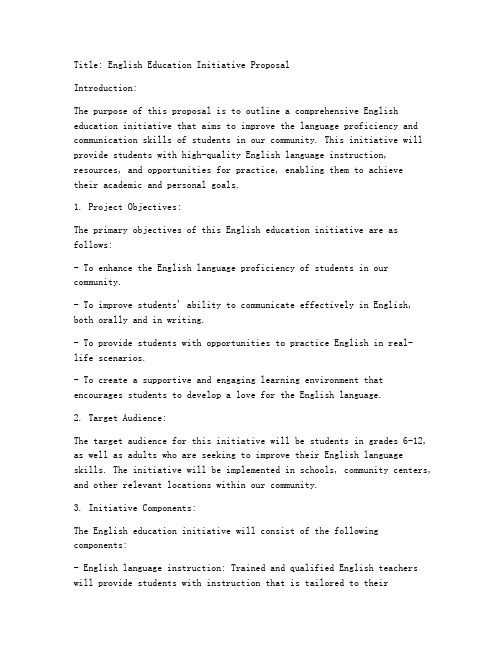
Title: English Education Initiative ProposalIntroduction:The purpose of this proposal is to outline a comprehensive English education initiative that aims to improve the language proficiency and communication skills of students in our community. This initiative will provide students with high-quality English language instruction, resources, and opportunities for practice, enabling them to achievetheir academic and personal goals.1. Project Objectives:The primary objectives of this English education initiative are as follows:- To enhance the English language proficiency of students in our community.- To improve students' ability to communicate effectively in English, both orally and in writing.- To provide students with opportunities to practice English in real-life scenarios.- To create a supportive and engaging learning environment that encourages students to develop a love for the English language.2. Target Audience:The target audience for this initiative will be students in grades 6-12, as well as adults who are seeking to improve their English language skills. The initiative will be implemented in schools, community centers, and other relevant locations within our community.3. Initiative Components:The English education initiative will consist of the following components:- English language instruction: Trained and qualified English teachers will provide students with instruction that is tailored to theirindividual needs and learning styles. The curriculum will cover all aspects of language learning, including grammar, vocabulary, pronunciation, listening, speaking, reading, and writing.- Resources and materials: Students will have access to a wide range of resources and materials, including textbooks, workbooks, online resources, and multimedia materials. These resources will be used to support and enhance the instruction provided by teachers.- Opportunities for practice: Students will have the opportunity to practice their English language skills in real-life scenarios, such as through participation in English clubs, speaking competitions, and community service projects.- Parent and community involvement: Parents and community members will be encouraged to participate in English language learning activities, such as parent workshops and community events, to support and encourage their children's learning.4. Implementation Plan:The English education initiative will be implemented over a period of two years. The following steps will be taken to ensure successful implementation:- Conduct a needs assessment to identify the specific English language needs and goals of the target audience.- Train and hire qualified English teachers who have experience in teaching English as a second language.- Develop a comprehensive curriculum that meets the needs of students at various levels of proficiency.- Provide students with access to a wide range of resources and materials to support their learning.- Organize regular English language learning activities, such as English clubs, speaking competitions, and community service projects.- Monitor and evaluate the progress of students and make necessary adjustments to the initiative as needed.5. Expected Outcomes:The English education initiative is expected to achieve the following outcomes:- Improved English language proficiency and communication skills among students in our community.- Increased confidence and motivation among students to continue learning English.- Enhanced parent and community involvement in English language learning activities.- A more inclusive and diverse community that values and appreciates the English language.6. Budget:The estimated budget for the two-year implementation of the English education initiative is as follows:- Teacher salaries and training: $40,000- Curriculum development and resources: $20,000- Student materials and resources: $10,000- Program evaluation and assessment: $5,000- Marketing and communication: $5,000Total budget: $80,000Conclusion:The English education initiative outlined in this proposal will have a significant positive impact on the English language proficiency and communication skills of students in our community. By providing high-quality English language instruction, resources, and opportunities forpractice, we will enable students to achieve their academic and personal goals and contribute to a more inclusive and diverse community. Wekindly request your support and assistance in implementing this initiative.。
英语课题立项申请书
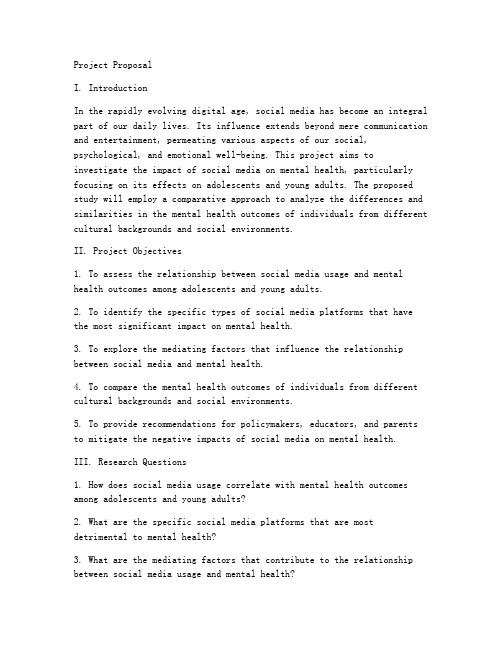
Project ProposalI. IntroductionIn the rapidly evolving digital age, social media has become an integral part of our daily lives. Its influence extends beyond mere communication and entertainment, permeating various aspects of our social, psychological, and emotional well-being. This project aims toinvestigate the impact of social media on mental health, particularly focusing on its effects on adolescents and young adults. The proposed study will employ a comparative approach to analyze the differences and similarities in the mental health outcomes of individuals from different cultural backgrounds and social environments.II. Project Objectives1. To assess the relationship between social media usage and mental health outcomes among adolescents and young adults.2. To identify the specific types of social media platforms that have the most significant impact on mental health.3. To explore the mediating factors that influence the relationship between social media and mental health.4. To compare the mental health outcomes of individuals from different cultural backgrounds and social environments.5. To provide recommendations for policymakers, educators, and parents to mitigate the negative impacts of social media on mental health.III. Research Questions1. How does social media usage correlate with mental health outcomes among adolescents and young adults?2. What are the specific social media platforms that are most detrimental to mental health?3. What are the mediating factors that contribute to the relationship between social media usage and mental health?4. Are there significant differences in mental health outcomes between individuals from different cultural backgrounds and social environments?5. What strategies can be implemented to promote healthier social media usage and improve mental health?IV. MethodologyThis project will employ a mixed-methods approach, combiningquantitative and qualitative research methods to gather comprehensive data. The following methodology will be used:1. Literature Review: An extensive review of existing literature on the impact of social media on mental health will be conducted to identify gaps in current research and to establish a theoretical framework for the proposed study.2. Quantitative Data Collection: A survey will be designed to collect data on social media usage patterns, mental health outcomes, and demographic information from a sample of adolescents and young adults. The survey will be distributed through various online platforms and social media channels to ensure a diverse and representative sample.3. Qualitative Data Collection: In-depth interviews will be conducted with a subset of the survey participants to gain insights into their personal experiences with social media and its impact on their mental health.4. Data Analysis: Quantitative data will be analyzed using statistical software (e.g., SPSS) to identify correlations and trends. Qualitative data will be analyzed using thematic analysis to identify common themes and patterns.V. Expected OutcomesThe proposed study is expected to yield several significant outcomes:1. A better understanding of the relationship between social media usage and mental health outcomes among adolescents and young adults.2. Identification of specific social media platforms that pose a greater risk to mental health.3. Insights into the mediating factors that influence the relationship between social media and mental health.4. Comparative analysis of mental health outcomes across different cultural backgrounds and social environments.5. Recommendations for policymakers, educators, and parents to promote healthier social media usage and improve mental health.VI. BudgetThe budget for this project is estimated to be $50,000, which will cover the following expenses:1. Survey design and distribution: $10,0002. Data analysis software: $5,0003. In-depth interviews: $10,0004. Research assistants: $10,0005. Contingency funds: $5,000VII. ConclusionThis project is designed to shed light on the complex relationship between social media usage and mental health. By exploring this relationship through a comparative lens, we aim to contribute valuable insights to the ongoing discussion on how to mitigate the negative impacts of。
高中英语读后续写课题立项申请书
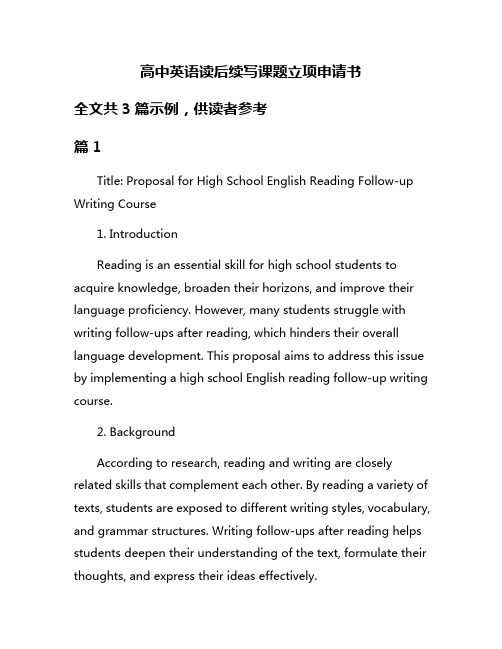
高中英语读后续写课题立项申请书全文共3篇示例,供读者参考篇1Title: Proposal for High School English Reading Follow-up Writing Course1. IntroductionReading is an essential skill for high school students to acquire knowledge, broaden their horizons, and improve their language proficiency. However, many students struggle with writing follow-ups after reading, which hinders their overall language development. This proposal aims to address this issue by implementing a high school English reading follow-up writing course.2. BackgroundAccording to research, reading and writing are closely related skills that complement each other. By reading a variety of texts, students are exposed to different writing styles, vocabulary, and grammar structures. Writing follow-ups after reading helps students deepen their understanding of the text, formulate their thoughts, and express their ideas effectively.3. ObjectivesThe main objectives of the proposed course are:- To help students improve their reading comprehension skills- To enhance students' writing skills and fluency- To encourage critical thinking and analytical skills- To foster creativity and self-expression through writing- To prepare students for higher education and future careers4. Course StructureThe reading follow-up writing course will be designed as a semester-long elective for high school students. The course will consist of the following components:- Reading assignments: Students will read a variety of texts, including short stories, novels, articles, and poems.- Writing exercises: Students will be required to write follow-ups to the reading assignments, such as summaries, analyses, reflections, and creative responses.- Peer feedback: Students will exchange their writing with classmates for feedback and revision.- Teacher guidance: The teacher will provide individualized feedback to help students improve their writing skills.- Assessment: Students will be assessed based on their reading comprehension, writing quality, creativity, and critical thinking skills.5. Expected OutcomesBy the end of the course, students are expected to:- Improve their reading comprehension skills and vocabulary- Enhance their writing fluency and coherence- Develop critical thinking and analytical skills- Express their ideas effectively through writing- Gain confidence in their writing abilities6. BudgetThe budget for the proposed course includes textbooks, reading materials, writing supplies, and teacher training. The total cost is estimated at $5000.7. ConclusionIn conclusion, the high school English reading follow-up writing course aims to improve students' reading and writing skills, critical thinking abilities, and overall language proficiency. By implementing this course, we can better prepare students for success in higher education and future careers. Thank you for considering this proposal.篇2Title: Proposal for High School English Reading Extension Writing Topic1. IntroductionReading extension writing is an essential component of high school English education, aiming to develop students' critical thinking, writing skills, and analytical abilities. This proposal seeks to establish a structured program for high school students to engage in reading a variety of texts and subsequently write extended responses that demonstrate a deep understanding of the material.2. ObjectivesThe primary objectives of this program are as follows:- To improve students' reading comprehension skills through exposure to diverse texts.- To enhance students' writing abilities by requiring them to analyze and interpret the texts they have read.- To develop students' critical thinking skills by encouraging them to form opinions and arguments based on evidence from the texts.- To foster a love of reading and provide students with the tools to engage with literature independently.3. Program StructureThe program will consist of a series of reading assignments, followed by writing tasks that require students to engage critically with the texts. Each reading assignment will be carefully selected to expose students to different genres, themes, styles, and time periods. After completing the reading, students will be tasked with writing an extended response that addresses specific prompts related to the text. These prompts will encourage students to analyze characters, themes, motifs, and literary devices, as well as form connections to their own lives and other texts.4. AssessmentStudents' performance in the program will be assessed based on their reading comprehension, writing fluency, critical analysis, and engagement with the texts. Assessment will be based on criteria such as thesis development, organization, textual evidence, analysis, and grammar. Additionally, students will be evaluated on their ability to synthesize ideas, think creatively, and present coherent arguments.5. ImplementationThe program will be implemented as an optional extracurricular activity for high school students. Participation will be voluntary, but highly encouraged for students looking to improve their reading and writing skills. The program will be facilitated by English teachers, who will provide guidance, feedback, and support to students throughout the reading and writing process.6. ConclusionIn conclusion, the proposed program for high school English reading extension writing has the potential to significantly enhance students' reading and writing skills, as well as their critical thinking abilities. By engaging with a variety of texts and responding thoughtfully to prompts, students will develop a deeper appreciation for literature and improve their ability tocommunicate effectively through writing. It is hoped that this program will inspire students to become lifelong readers and critical thinkers.篇3Title: Proposal for High School English Reading Follow-up Writing ProjectIntroduction:Reading is an essential part of language learning, and writing helps to reinforce comprehension and express ideas. Integrating reading and writing activities can be a powerful way to enhance students' language skills. In this proposal, we will outline a project aimed at developing students' abilities in both reading and writing through a series of follow-up writing tasks after reading different literary texts in the high school English curriculum.Project Objectives:1. To improve students' reading comprehension by engaging them in close reading and analysis of literary texts.2. To enhance students' writing skills by providing opportunities for them to practice different types of writing tasks.3. To promote critical thinking and creativity through students' personal responses to the texts they have read.4. To foster a love for literature and language learning by connecting reading and writing activities in a meaningful way.Project Activities:1. Selecting literary texts from the high school English curriculum that are suitable for follow-up writing tasks.2. Designing writing prompts that encourage students to reflect on and respond to the themes, characters, and situations presented in the texts.3. Providing guidance and support for students as they draft and revise their written responses.4. Creating opportunities for students to share and discuss their writing with their peers, providing feedback and encouragement.Project Implementation:The project will be implemented as a series of follow-up writing tasks after students have read a selected literary text in their English classes. Teachers will introduce the writing prompts, facilitate the writing process, and provide feedback on students' written responses. Peer review and discussion will also be incorporated to promote collaboration and a deeper understanding of the texts.Project Evaluation:The success of the project will be evaluated based on students' reading comprehension skills, writing proficiency, critical thinking abilities, and overall engagement with the texts. Surveys and feedback from teachers and students will also be used to assess the impact of the project on students' attitudes towards reading and writing in English.Conclusion:By integrating reading and writing activities in the high school English curriculum, this project aims to enhance students' language skills, promote critical thinking and creativity, and foster a love for literature and language learning. We believe that this project will provide valuable learning experiences for students and contribute to their overall development as English language learners.。
高中英语立项申请书模板
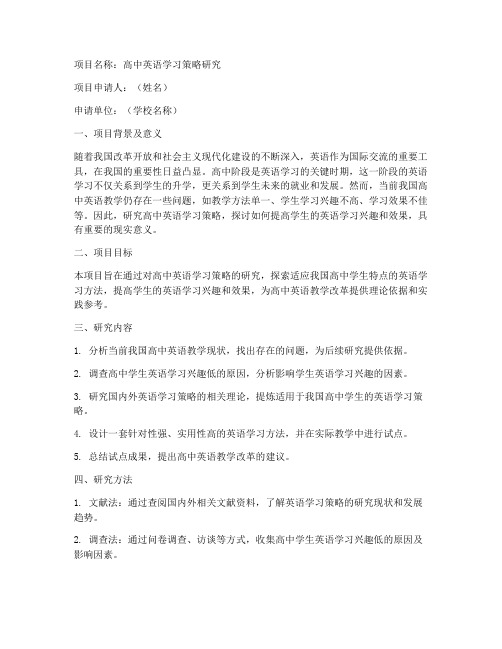
项目名称:高中英语学习策略研究项目申请人:(姓名)申请单位:(学校名称)一、项目背景及意义随着我国改革开放和社会主义现代化建设的不断深入,英语作为国际交流的重要工具,在我国的重要性日益凸显。
高中阶段是英语学习的关键时期,这一阶段的英语学习不仅关系到学生的升学,更关系到学生未来的就业和发展。
然而,当前我国高中英语教学仍存在一些问题,如教学方法单一、学生学习兴趣不高、学习效果不佳等。
因此,研究高中英语学习策略,探讨如何提高学生的英语学习兴趣和效果,具有重要的现实意义。
二、项目目标本项目旨在通过对高中英语学习策略的研究,探索适应我国高中学生特点的英语学习方法,提高学生的英语学习兴趣和效果,为高中英语教学改革提供理论依据和实践参考。
三、研究内容1. 分析当前我国高中英语教学现状,找出存在的问题,为后续研究提供依据。
2. 调查高中学生英语学习兴趣低的原因,分析影响学生英语学习兴趣的因素。
3. 研究国内外英语学习策略的相关理论,提炼适用于我国高中学生的英语学习策略。
4. 设计一套针对性强、实用性高的英语学习方法,并在实际教学中进行试点。
5. 总结试点成果,提出高中英语教学改革的建议。
四、研究方法1. 文献法:通过查阅国内外相关文献资料,了解英语学习策略的研究现状和发展趋势。
2. 调查法:通过问卷调查、访谈等方式,收集高中学生英语学习兴趣低的原因及影响因素。
3. 实验法:在实际教学中应用所设计的英语学习方法,观察学生的学习效果,以验证其有效性。
4. 数据分析法:对收集到的数据进行统计分析,找出英语学习策略与学习效果之间的关系。
五、项目进度安排1. 第一阶段(第1-3个月):进行项目筹备,查阅相关文献资料,确定研究方法。
2. 第二阶段(第4-6个月):开展问卷调查、访谈等实证研究,收集数据。
3. 第三阶段(第7-9个月):分析数据,提炼英语学习策略,设计试点方案。
4. 第四阶段(第10-12个月):实施试点,观察效果,总结经验。
英语学科立项申请书模板
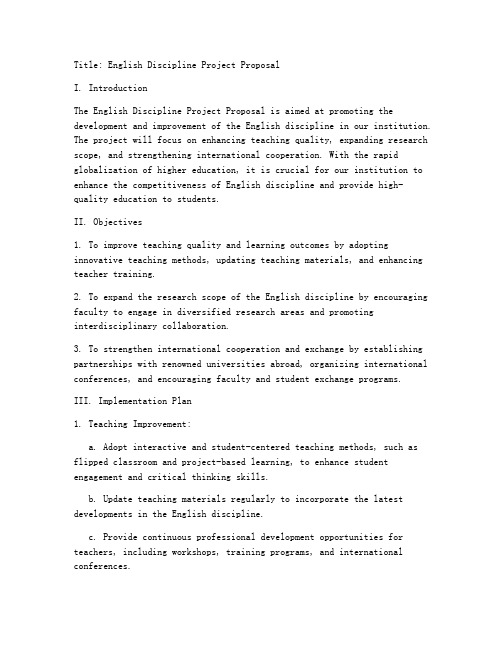
Title: English Discipline Project ProposalI. IntroductionThe English Discipline Project Proposal is aimed at promoting the development and improvement of the English discipline in our institution. The project will focus on enhancing teaching quality, expanding research scope, and strengthening international cooperation. With the rapid globalization of higher education, it is crucial for our institution to enhance the competitiveness of English discipline and provide high-quality education to students.II. Objectives1. To improve teaching quality and learning outcomes by adopting innovative teaching methods, updating teaching materials, and enhancing teacher training.2. To expand the research scope of the English discipline by encouraging faculty to engage in diversified research areas and promoting interdisciplinary collaboration.3. To strengthen international cooperation and exchange by establishing partnerships with renowned universities abroad, organizing international conferences, and encouraging faculty and student exchange programs.III. Implementation Plan1. Teaching Improvement:a. Adopt interactive and student-centered teaching methods, such as flipped classroom and project-based learning, to enhance student engagement and critical thinking skills.b. Update teaching materials regularly to incorporate the latest developments in the English discipline.c. Provide continuous professional development opportunities for teachers, including workshops, training programs, and international conferences.2. Research Enhancement:a. Encourage faculty to apply for national and provincial research projects, and provide necessary support and funding.b. Establish research centers and laboratories dedicated to the English discipline to facilitate faculty and student research activities.c. Promote interdisciplinary collaboration by organizing academic seminars, workshops, and conferences.3. International Cooperation:a. Establish partnerships with renowned universities in English-speaking countries to facilitate faculty and student exchange programs.b. Organize international conferences and workshops in collaboration with international academic organizations.c. Encourage faculty and students to participate in international exchange programs, conferences, and seminars to broaden their horizons and enhance their international competitiveness.IV. Expected Outcomes1. Improved teaching quality and learning outcomes, as evidenced by higher student satisfaction and better academic performance.2. Expanded research scope and increased research output, as evidencedby more publications, conferences, and partnerships with international institutions.3. Strengthened international cooperation and exchange, as evidenced by increased student and faculty exchange programs, joint research projects, and international conferences.V. Budget and FundingThe project requires a total budget of [amount] to cover teaching materials, teacher training, research funding, international cooperation activities, and other related expenses. We plan to apply for fundingfrom the institution's internal grant program, as well as seek externalfunding from government agencies, private enterprises, and international organizations.VI. ConclusionThe English Discipline Project Proposal aims to promote the development and improvement of the English discipline in our institution. By focusing on teaching improvement, research enhancement, andinternational cooperation, we expect to enhance the competitiveness of our English program, provide high-quality education to students, and contribute to the advancement of the English discipline. We hope to secure the support and approval of the institution's administration and faculty.[Your Name][Your Position][Your Institution]。
英语教师课题立项申请书
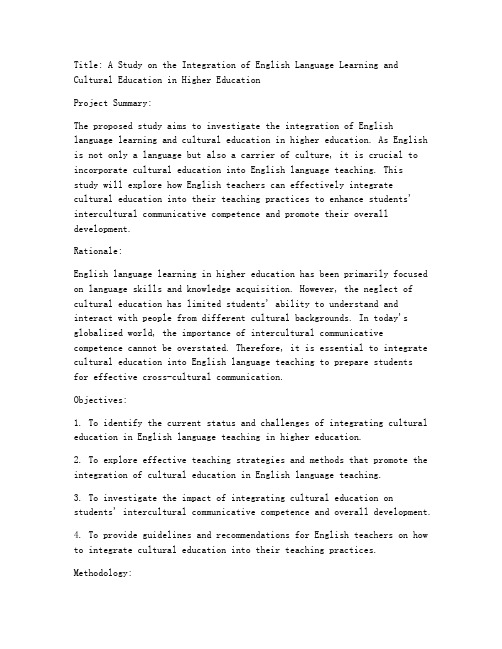
Title: A Study on the Integration of English Language Learning and Cultural Education in Higher EducationProject Summary:The proposed study aims to investigate the integration of English language learning and cultural education in higher education. As English is not only a language but also a carrier of culture, it is crucial to incorporate cultural education into English language teaching. This study will explore how English teachers can effectively integrate cultural education into their teaching practices to enhance students' intercultural communicative competence and promote their overall development.Rationale:English language learning in higher education has been primarily focused on language skills and knowledge acquisition. However, the neglect of cultural education has limited students' ability to understand and interact with people from different cultural backgrounds. In today's globalized world, the importance of intercultural communicative competence cannot be overstated. Therefore, it is essential to integrate cultural education into English language teaching to prepare studentsfor effective cross-cultural communication.Objectives:1. To identify the current status and challenges of integrating cultural education in English language teaching in higher education.2. To explore effective teaching strategies and methods that promote the integration of cultural education in English language teaching.3. To investigate the impact of integrating cultural education on students' intercultural communicative competence and overall development.4. To provide guidelines and recommendations for English teachers on how to integrate cultural education into their teaching practices.Methodology:The study will employ a mixed-methods approach, combining both qualitative and quantitative research methods. The sample populationwill consist of English teachers and students from various universities in China. Data collection methods will include surveys, interviews, and classroom observations. The collected data will be analyzed using statistical software and thematic analysis to draw meaningful conclusions.Expected Outcomes:1. A comprehensive understanding of the current status and challenges of integrating cultural education in English language teaching in higher education.2. A set of effective teaching strategies and methods that promote the integration of cultural education in English language teaching.3. Evidence of the impact of integrating cultural education on students' intercultural communicative competence and overall development.4. Recommendations for English teachers on how to integrate cultural education into their teaching practices.Significance:The findings of this study will contribute to the existing body of research on English language teaching and cultural education. It will provide valuable insights for English teachers on how to effectively integrate cultural education into their teaching practices, ultimately enhancing students' intercultural communicative competence and preparing them for success in the globalized world.Timeline:The proposed study will be conducted over a period of 18 months. Thefirst six months will be dedicated to literature review and methodology development. The next six months will be focused on data collection and analysis. The final three months will be spent on writing the research report and disseminating the findings.Budget:The total estimated budget for this project is RMB 80,000. The fundswill be primarily used for research expenses, including data collection, participant compensation, and travel expenses.In conclusion, the proposed study on the integration of English language learning and cultural education in higher education is of significant importance. By providing practical guidelines and recommendations for English teachers, this study will contribute to enhancing students' intercultural communicative competence and overall development. We hope to receive your support and approval for this project.Sincerely,[Your Name]。
英语课题立项申请书
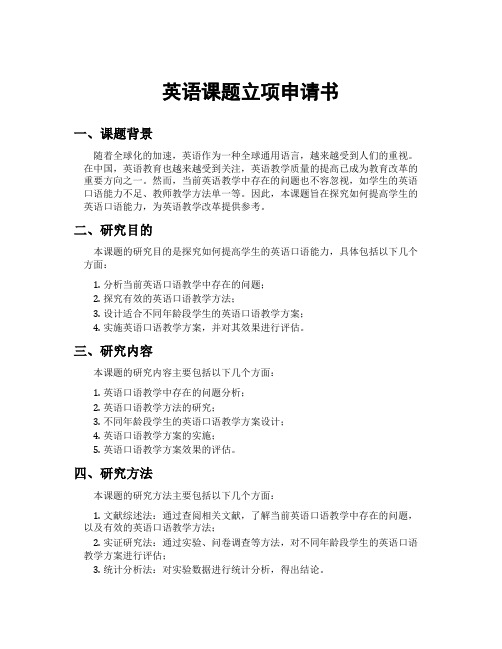
英语课题立项申请书一、课题背景随着全球化的加速,英语作为一种全球通用语言,越来越受到人们的重视。
在中国,英语教育也越来越受到关注,英语教学质量的提高已成为教育改革的重要方向之一。
然而,当前英语教学中存在的问题也不容忽视,如学生的英语口语能力不足、教师教学方法单一等。
因此,本课题旨在探究如何提高学生的英语口语能力,为英语教学改革提供参考。
二、研究目的本课题的研究目的是探究如何提高学生的英语口语能力,具体包括以下几个方面:1.分析当前英语口语教学中存在的问题;2.探究有效的英语口语教学方法;3.设计适合不同年龄段学生的英语口语教学方案;4.实施英语口语教学方案,并对其效果进行评估。
三、研究内容本课题的研究内容主要包括以下几个方面:1.英语口语教学中存在的问题分析;2.英语口语教学方法的研究;3.不同年龄段学生的英语口语教学方案设计;4.英语口语教学方案的实施;5.英语口语教学方案效果的评估。
四、研究方法本课题的研究方法主要包括以下几个方面:1.文献综述法:通过查阅相关文献,了解当前英语口语教学中存在的问题,以及有效的英语口语教学方法;2.实证研究法:通过实验、问卷调查等方法,对不同年龄段学生的英语口语教学方案进行评估;3.统计分析法:对实验数据进行统计分析,得出结论。
五、预期成果本课题的预期成果主要包括以下几个方面:1.发表学术论文:将研究结果发表在相关学术期刊上,为英语教学改革提供参考;2.编写教材:根据研究结果,编写适合不同年龄段学生的英语口语教材;3.推广应用:将研究结果应用于实际教学中,提高学生的英语口语能力。
六、研究计划本课题的研究计划如下:时间研究内容第一年1. 文献综述;2. 英语口语教学方法研究;3. 不同年龄段学生的英语口语教学方案设计第二年1. 英语口语教学方案实施;2. 实验数据收集与分析第三年1. 实验数据分析;2. 结果总结与论文撰写;3. 教材编写七、研究团队本课题的研究团队由以下人员组成:1.课题负责人:XXX,教授,从事英语教学研究多年,具有丰富的教学经验;2.研究人员:XXX,博士生,研究方向为英语教育;3.研究人员:XXX,硕士生,研究方向为英语教育。
中学英语立项申请书模板
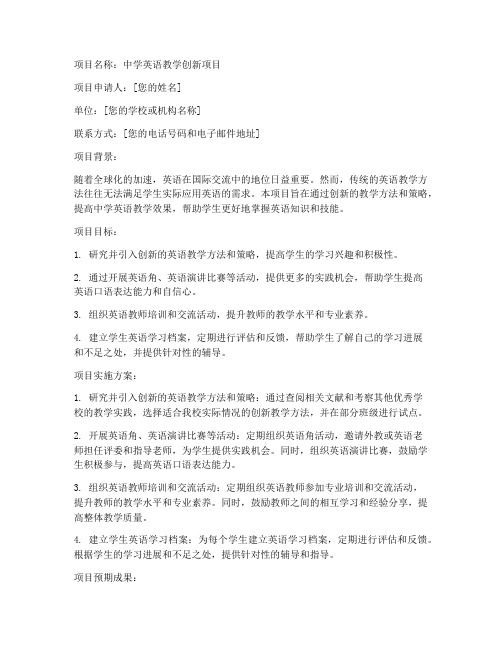
项目名称:中学英语教学创新项目项目申请人:[您的姓名]单位:[您的学校或机构名称]联系方式:[您的电话号码和电子邮件地址]项目背景:随着全球化的加速,英语在国际交流中的地位日益重要。
然而,传统的英语教学方法往往无法满足学生实际应用英语的需求。
本项目旨在通过创新的教学方法和策略,提高中学英语教学效果,帮助学生更好地掌握英语知识和技能。
项目目标:1. 研究并引入创新的英语教学方法和策略,提高学生的学习兴趣和积极性。
2. 通过开展英语角、英语演讲比赛等活动,提供更多的实践机会,帮助学生提高英语口语表达能力和自信心。
3. 组织英语教师培训和交流活动,提升教师的教学水平和专业素养。
4. 建立学生英语学习档案,定期进行评估和反馈,帮助学生了解自己的学习进展和不足之处,并提供针对性的辅导。
项目实施方案:1. 研究并引入创新的英语教学方法和策略:通过查阅相关文献和考察其他优秀学校的教学实践,选择适合我校实际情况的创新教学方法,并在部分班级进行试点。
2. 开展英语角、英语演讲比赛等活动:定期组织英语角活动,邀请外教或英语老师担任评委和指导老师,为学生提供实践机会。
同时,组织英语演讲比赛,鼓励学生积极参与,提高英语口语表达能力。
3. 组织英语教师培训和交流活动:定期组织英语教师参加专业培训和交流活动,提升教师的教学水平和专业素养。
同时,鼓励教师之间的相互学习和经验分享,提高整体教学质量。
4. 建立学生英语学习档案:为每个学生建立英语学习档案,定期进行评估和反馈。
根据学生的学习进展和不足之处,提供针对性的辅导和指导。
项目预期成果:1. 学生的英语学习成绩明显提高,学习兴趣和积极性得到提升。
2. 学生的英语口语表达能力和自信心得到提高,能够更好地适应国际化竞争环境。
3. 英语教师的教学水平和专业素养得到提升,能够更好地满足学生的发展需求。
4. 学生英语学习档案的建立和完善,为学生的个性化学习和辅导提供有力支持。
项目预算:1. 教学设备和材料的购置:5000元2. 教师培训和交流活动的费用:8000元3. 学生活动的组织和实施费用:6000元4. 项目管理和评估费用:4000元总计:23000元申请单位意见:[请填写申请单位对项目的意见和批准情况]申请人签名:日期:[请填写申请日期]。
- 1、下载文档前请自行甄别文档内容的完整性,平台不提供额外的编辑、内容补充、找答案等附加服务。
- 2、"仅部分预览"的文档,不可在线预览部分如存在完整性等问题,可反馈申请退款(可完整预览的文档不适用该条件!)。
- 3、如文档侵犯您的权益,请联系客服反馈,我们会尽快为您处理(人工客服工作时间:9:00-18:30)。
编号西南大学校级精品课程建设立项申请书推荐学院外国语学院课程名称高级英语所属一级学科名称文学所属二级学科名称外国语言文学类课程负责人罗益民申报日期2010,3,15西南大学制年月日填写要求一、请严格按表中要求如实填写各项。
二、申报表文本中外文名词第一次出现时,要写清全称和缩写,再次出现同一词时可以使用缩写。
三、请以word文档格式填写表中各栏目。
四、凡涉密内容不得填写,需要说明的,请在本表说明栏中注明。
凡有可能涉密和不宜大范围公开的内容,请在说明栏中注明。
1.课程负责人[1]情况1-1基本信息姓名罗益民性别男出生年月1964年9月最终学历研究生职称教授电话68252905学位博士职务传真所在院系外国语学院E-mail luoyimin@通信地址(邮编)西南大学外国语学院1-2教学概况近五年来讲授的主要课程(含课程名称、课程类别、周学时;届数及学生总人数)(不超过五门);承担的实践性教学(含实验、实习、课程设计、毕业论文、毕业设计的年限、学生总人数);主持的教学研究课题(含课题名称、来源、年限、本人所起作用)(不超过五项);作为第一署名人在国内外主要刊物上发表的教学相关论文(含题目、刊物名称与级别、时间)(不超过十项);获得的教学表彰/奖励(含奖项名称、授予单位、署名次序、时间)(不超过五项)。
(一)主授课程名称类别周学时届数学生总数高级英语本科,必修课42004-2006级300人英译汉本科,必修课62004级63人英美诗歌本科,选修课32004-2008级120人西方文论与批评实践硕士生,必修课22006-2010级约240人莎士比亚研究硕士生,必选课22006-2010级约200人(二)实践性教学1.积极参与本科生毕业论文指导,2006-2011年,共28人;参与硕士生毕业论文指导,2006-2011年,共20人。
2.承担本科生导师工作,2006-2011年,共指导35人;担任硕士及博士生导师,2006-2011年,共指导40人。
(三)教学论文1.“民主论与大学人文课程教学”,《现代大学教育》(教育学类CSSCI期刊),2010年第2期。
2.“The Fallacy of Democracy:A Discussion of Self-Centered PolicyTeaching of Shakespeare.”Shakespeare Review(Korea).Vol.46,No.1,2010(65-79).ISSN:1226-2668.(国际一般期刊)3.“教学相长别论”,《重庆大学学报·社会科学版》(综合类CSSCI期刊),2008年第1期。
4.《高级文学翻译教程》,第一副主编,北京:外语教学与研究出版社,2009年。
5.《英语短篇小说教程》,主编,重庆:重庆大学出版社,2009年。
6.《莎士比亚十四行诗名篇详注》,编著,北京:中国人民大学出版社,2009年。
7.《双语词典新论》,主编,成都:四川人民出版社,2007年。
8.《英国文学选读》(国家十一五规划教材),合著,郑州:河南人民出版社,2006年。
[1]课程负责人指主持本门课程建设的主讲教师。
1-3学术研究近五年来承担的学术研究课题(含课题名称、课题类别、来源、年限、本人所起作用)(不超过五项);在国内外主要学术刊物上发表的学术论文(含题目、刊物名称与级别、时间、署名次序)(不超过十项);获得的学术研究表彰/奖励(含奖项名称、授予单位、时间、署名次序)(不超过五项)。
(一)学术研究课题1.《莎士比亚十四行诗版本批评史》,国家社科基金项目,2005-2010年,主持;2.《莎士比亚十四行诗诗学文体学》,教育部留学回国人员科研启动基金项目,2007-2009年,主持;3.《文化创伤的时间维度研究》,国家社科基金项目,2008-2010年,主研第二;4.《英国十六、十七世纪巴罗克文学研究》,国家社科基金项目,2007-2009年,主研第一;5.《新中国外国文学研究60年》,国家社会科学基金重大项目,2009-2012年,主研。
(二)学术论文1.“经典的力量:关于莎士比亚十四行诗与华兹华斯《序曲》的个案研究”,《外国文学研究》,AHC&I期刊;CSSCI期刊,2011年第1期,独立作者;2.“莎士比亚十四行诗的拓扑学宇宙论”,《中华文化论坛》,全国中文核心期刊中国人文社会科学核心期刊四川省一级期刊,2010年第1期,排名第一〔后被中国人民大学报刊复印资料中心《外国文学研究》2010年第8期全文转载〕;3.“A Chinese Map of Translation of Shakespeare’s Sonnets.”Shakespeare Yearbook17.New York:Edwin Mellen Press,2010;AHC&I期刊;独立作者;4.“灯火阑珊之处:乔伊斯《死者》与圣杯传统“,《当代外国文学》,CSSCI期刊;2009年第4期,排名第一;5.“词典评论中的评价体系”,《辞书研究》,CSSCI期刊,2009年第2期,排名第一;6.“打开心灵之锁的金钥匙”,《四川外语学院学报》(今名《外国语文》),CSSCI扩展期刊,2008年第5期,排名第一;7.“元戏剧理论面面观”,《当代外国文学》,CSSCI期刊,2008年第4期,排名第一;8.“管萧婚曲声中的流浪者:柯尔律治《古舟子咏》中的基督教主题”,《国外文学》;CSSCI期刊,2006年第3期,独立作者。
(三)学术研究表彰/奖励1.论文“新批评的诗歌翻译方法论”;获《中国翻译》创刊30周年有奖征文三等奖;三等奖第二;2010年。
2.论文“完形理论与消极能力说”;获重庆市新闻出版局、重庆市期刊协会评选的第六届重庆市期刊好稿一等奖;独立作者;2007年。
3.荣获“重庆市第二届学术技术带头人”,英语语言文学类,2008年。
4.荣获“重庆市第三届高等学校优秀中青年骨干教师”,2006年。
2.教学队伍情况2-1人员构成姓名性别出生年月职称学科专业在教学中承担的工作刘承宇男1963,11教授英语语言文学主讲教师贾志高男1954,10教授英语语言文学主讲教师李长泰男1955,12教授英语语言文学主讲教师晏奎男1961,2教授英语语言文学主讲教师杜世洪男1966,3教授英语语言文学主讲教师刘颀女1963,2副教授英语语言文学主讲教师张俊男1971,6副教授英语语言文学主讲教师申劲松男1972,5副教授英语语言文学主讲教师唐瑞梁男1979,11副教授英语语言文学主讲教师肖丹女1967,5副教授英语语言文学主讲教师陈燕女1976,5副教授英语语言文学主讲教师胡蕾女1976,1副教授英语语言文学主讲教师梁爽女1973,7副教授英语语言文学主讲教师邓晓芳女1970,3副教授英语语言文学主讲教师罗朗男1974,4副教授英语语言文学主讲教师黄学军女1968,10副教授英语语言文学主讲教师杨竹男1981,9副教授英语语言文学主讲教师刘丹女1979,4副教授英语语言文学主讲教师王玮女1977,8讲师英语语言文学主讲教师2-2教学队伍整体情况概述教学队伍的知识结构、年龄结构、师资配置情况(含辅导教师或实验教师与学生的比例);主要成员的教学经历、年终考核成绩以及中青年教师培养计划与效果。
《高级英语》为英语专业三、四年级最为重要的专业基础课和主干课,它要求教师具有很高的专业素质和课堂教学能力,因而担任本课程的教师都是本专业最优秀的教师。
课程组成员在年龄、职称、学历和学缘结构方面配置优良。
所有课程组成员中,45岁以下的中青年教师约占70%,共有14人,45-50岁的有4人,50岁以上有2人;职称结构为:教授5人,副教授14人,讲师1人;其中硕导15位,博导2人;几乎所有的教师都具有高级职称。
从学历结构来看,具有博士学位的教师有14人,在读博士1人,具有硕士学位的教师7名。
研究方向涵盖了英美文学、语言学、外语教学、翻译、跨文化交际、心理学、教育学等,师资队伍知识结构良好,实现了英语语言文学专业的最佳组合与知识互补。
在学缘结构上,除本院毕业生之外,大部分教师都是在国内外知名高校攻读的硕、博士学位,其中包括York University,university of Bristol,北京大学、厦门大学、上海外国语大学、广东外语外贸大学、南京大学、中山大学、山东大学和四川大学;其中有5人曾先后进入中山大学、西南大学和北京师范大学博士后流动站;除此之外,课程组的绝大多数教师都有在美国、英国、澳大利亚等国访学进修的经历;这些教师在国内外知名高校的学习和工作经历使他们更广泛地接触到当今先进的教学理念和科研动态,为本课程的教学实践和改革打下了坚实的基础。
该课程的师资配置中除主讲教师外还有由离退休专家和在职教授组成的教学督导组,为本课程的教学质量提供了保证。
本课程组师资队伍结构合理,专业素质高,教学理念新,教学能力强,为本课程的建设和发展提供强大的后续动力。
本课程组的主要成员都有很强的英语语言应用能力和专业英语教学能力,具有多年的教学经历,除《高级英语》外,大部分老师还担任过《英汉翻译》、《论文写作》、《词汇学》、《英美诗歌》、《英语教育导论》、《中学英语教学设计》等课程,多门课程的交叉教学经验极大提升了教师的综合素质,为他们教授《高级英语》这门综合性课程奠定了稳定的基石。
本课程组教师经过多年的教学实践,具有丰富的执教经验;同时具有很强的课改和教改意识,所授课程都能反映当今的教学理念和教学方法。
课程组教师年终考核优良。
学院在本课程中青年教师的培养方面采取了不少措施,主要包括:1.鼓励青年教师攻读博士学位;2.为青年教师选派副高职称以上的教师指导他们的教学和科研;3.鼓励青年教师参加国内外学术会议和教学研讨会;4.努力为青年教师出国进修学习创造条件和机会;5.设立青年教师教研教改基金,鼓励他们发表教改论文,积极参与本课程教材和多媒体课件的编写和制作,不定期举办现代教育技术培训班,评选优秀电子课件并予以奖励,提高教师们课堂上运用现代教育技术的能力;6.开展诸如听课、赛课、集体备课等教研活动,提高青年教师的课堂教学及教研能力。
通过以上举措,增强了青年教师教研和科研意识,有效地提高了青年教师的教学科研能力,业已取得良好效果,课程组中已有70%的中青年教师获得博士学位,全部青年教师均主持或主研国家级、省部级和校级科研项目。
2-3教学改革与教学研究近五年来教学队伍教研活动涉及的领域、提出是教改项目和措施、已经解决的问题和取得的教改成果;在国内外主要学术刊物上发表的教研论文(含题目、刊物名称与级别、时间、署名次序)(不超过十项)(不含第一署名人为课程负责人的成果);获得的教学研究表彰/奖励(含奖项名称、授予单位、时间、署名次序)(不超过五项)。
